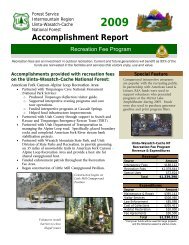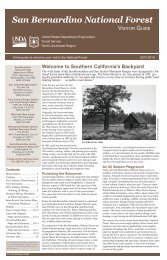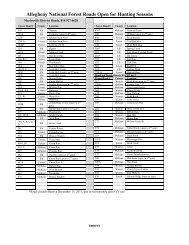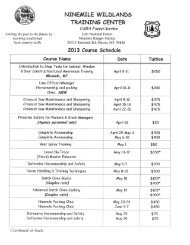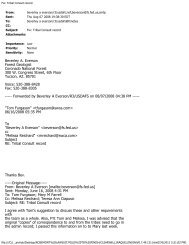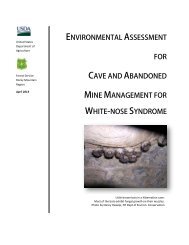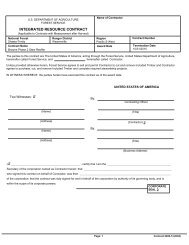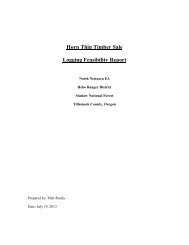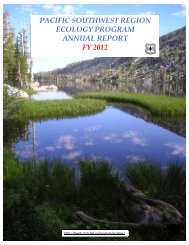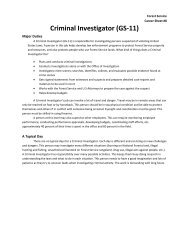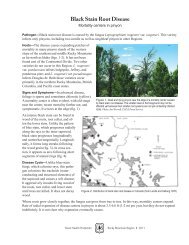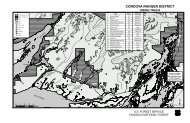Resource Name (Heading 1) - USDA Forest Service - US ...
Resource Name (Heading 1) - USDA Forest Service - US ...
Resource Name (Heading 1) - USDA Forest Service - US ...
Create successful ePaper yourself
Turn your PDF publications into a flip-book with our unique Google optimized e-Paper software.
Summary of Public Comments - Managing Recreation Uses in the<br />
Upper Segment of the Chattooga Wild and Scenic River Corridor EA<br />
their favor and assume that they must be able to afford a nice legal team. But what about we individual<br />
citizens who feel strongly but do not have a lobbying organization pushing policy. This is exactly what is<br />
wrong with the Federal Government: special interest groups like Whitewater has the loudest voice because<br />
they have a ton of money. Please do NOT expand kayaking as you have done in this most recent proposal!<br />
(Ltr# 129, Cmt# 1)<br />
Subconcern # B D F<br />
I am writing to inform you that the Georgia Chapter of the Sierra Club is opposed to any Alternative that<br />
would open up the Chattooga River’s headwaters to boating. This stretch has been closed to boats for more<br />
than thirty years; the Sierra Club feels the ban should remain in place. The Upper Chattooga, which<br />
bisects the Ellicott Rock Wilderness, and the Rock Gorge area remains one of the premier wild areas of the<br />
eastern United States, a refuge for wildlife, people, and is one of the best backcountry trout streams in the<br />
country. We would, in fact, argue that opening the river for boating thru the Ellicott Rock Wilderness is<br />
inconsistent with the goals of the Wilderness Act. We are likewise concerned that allowing boating through<br />
the Rock Gorge section of the river, from the Highway 28 Bridge to Burrell's Ford, could severely damage<br />
this areas currently relatively unspoiled nature and potential for future wilderness designation. The Sierra<br />
Club has long supported full Wilderness protection for this area and an extension to the Ellicott Rock<br />
Wilderness. Therefore, the Sierra Club can only support a no-boating Alternative. Further, the Sierra Club<br />
feels that opening the area to boaters, and their vehicles, would overwhelm this fragile ecosystem and<br />
create additional conflicts with other users whose impacts are already too great for the resource. We feel<br />
protecting this area is critically important because as noted in the <strong>Forest</strong> <strong>Service</strong>’s own report on<br />
Watershed Conditions much of the area in question (Reed Creek/Chattooga River) is already listed as<br />
“impaired.” (see http://www.fs.fed.us/publications/watershed/) We fail to see how opening any of this<br />
section to more boating could improve this situation. Likewise, since watershed protection was a<br />
cornerstone of the current Land and <strong>Resource</strong> Management Plans for the three affected National <strong>Forest</strong>s<br />
this would seem to us to be in conflict with the goals of those plans as well. Whitewater boaters already<br />
have access to the majority of swift rapids in the area, including the entire West Fork of the Chattooga, and<br />
all of the Chattooga below the Highway 28 bridge. Overflow Creek all the way to North Carolina is also<br />
already open to boating. Given the <strong>Forest</strong> <strong>Service</strong>’s demonstrated lack of ability to police and protect this<br />
fragile and important ecosystem we see no way that adding additional users of any type is helpful. (Ltr#<br />
118, Cmt# 1)<br />
Subconcern # B D F<br />
I am writing to say I am opposed to any Alternative that would open the Chattooga River’s upper<br />
headwaters to boating. This part has been closed to boats for more than thirty years and the ban should<br />
remain in place. The reason for the ban is because the Upper Chattooga bisects the Ellicott Rock<br />
Wilderness, and Rock Gorge. These areas are the premier wild areas left in the eastern United States. They<br />
are one of the few refuges for wildlife, the public, and the best back country trout streams in America. (Ltr#<br />
140, Cmt# 1)<br />
Subconcern # C<br />
I feel that the best parts of the river for boating are already open. Opening the other sections even on a<br />
limited basis is unnecessary. Please leave the Chattooga as is and let those of us who seek solitude and<br />
nature continue to enjoy it and pass it down to the next generations. (Ltr# 55, Cmt# 3)<br />
Subconcern # D<br />
I am absolutely firm in my belief that keeping the current usage plan is the only decision which will protect<br />
and preserve the wild and scenic nature of this amazing wilderness. This present approach was the result<br />
of wisely considered alternatives using appropriate criteria. Just as predicted, the river now offers a<br />
variety of user experiences without overburdening or deteriorating its fragile environment. (Ltr# 71, Cmt#<br />
1)<br />
Subconcern # E<br />
Water access for boaters in north Georgia and South Carolina is adequate and quite accessible. I believe<br />
the upper reaches of the Chattooga are being unreasonably pressured by groups driven by greed and<br />
unnecessary longing who ignore the opportunities already offered in order to continue a path of access into<br />
every last vestige of pure natural area just for their own pertinent interests. This area should be left as is<br />
12



